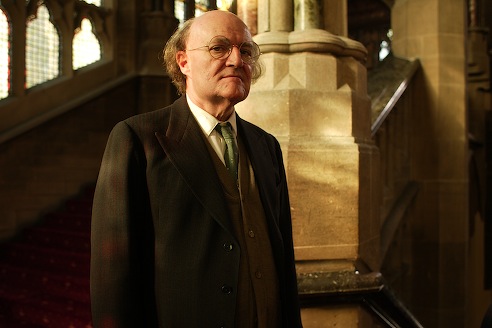Movie review: Longford (HBO)
02/16/07 05:40 PM

By ED BARK
Devoutly Catholic Frank Aungier Packenham led an outwardly thankless life. He had a missionary's zeal for visiting England's imprisoned, believing that one and all could achieve redemption and rehabilitation.
"No human being is beyond forgiveness," he believed with all his heart.
HBO's fact-based Longford (Saturday, Feb. 17 at 7 p.m. central) reprises his fatalistic attraction to a woman convicted of debasing and murdering children in the company of a male accomplice. The crimes were committed in the 1960s, and could be considered England's equivalent of the Manson Family murders. So why would anyone want to advocate the parole of one Myra Hindley (Samantha Morton), whom the country at large despised?
Oscar-winner Jim Broadbent (Iris) is thoroughly convincing as Packenham, who also happened to be the Earl of Longford until forced to retire in 1968. But the film's most arresting performance is by Andy Serkis as Hindley's hardened partner in crime, Ian Brady. His only scenes are behind bars in the company of Longford, whom he taunts and demeans in a most decidedly unredemptive manner. Serkis doesn't have much screen time, but he registers indelibly nonetheless.
The film's other key character is Longford's wife, Lady Elizabeth (Lindsay Duncan), who accepts her husband's mindset but wonders why he has become so fixated on Hindley.
"Couldn't you have found someone else -- something else," she implores. "For all our sakes?"
For a while he veers off into an odd and laughable crusade against pornography. But Longford's wife eventually becomes his ally after seeing the imprisoned Hindley in a bad state of disrepair.
Firmly directed by Tom Hooper (HBO's Elizabeth I), this isn't a bleeding heart call for either prison reform or freedom for all despots. Rather it's an affecting story of one man's steadfast convictions in the face of any and all detractors. Shades of President Bush? That thought just occurred. But no, Longford is about waging peace within the souls of humankind, no matter how foul the deed.
"To love the sinners but hate the sins," he says in the most basic of terms. "To see the best in people, not the worst."
The film ends poignantly, earning its final redemptive moment. One can thoroughly disagree with its protagonist's belief system. But Longford pushes us in the direction of understanding, not contempt.
Grade: B+
|
